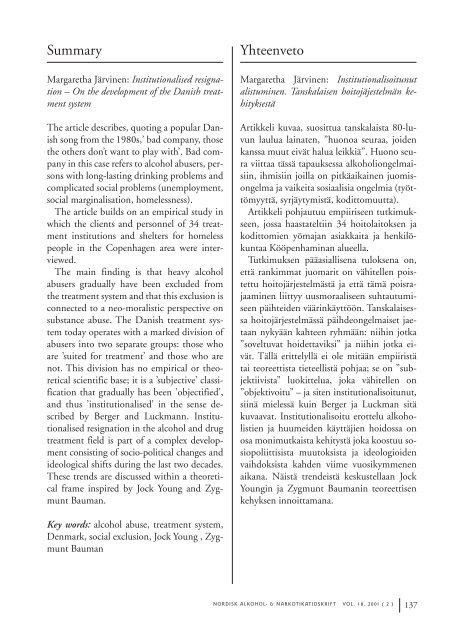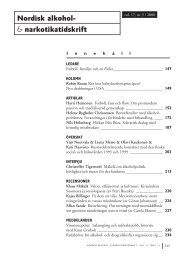I nneh å ll
I nneh å ll
I nneh å ll
You also want an ePaper? Increase the reach of your titles
YUMPU automatically turns print PDFs into web optimized ePapers that Google loves.
Summary<br />
Margaretha Järvinen: Institutionalised resignation<br />
– On the development of the Danish treatment<br />
system<br />
The article describes, quoting a popular Danish<br />
song from the 1980s,’ bad company, those<br />
the others don’t want to play with’. Bad company<br />
in this case refers to alcohol abusers, persons<br />
with long-lasting drinking problems and<br />
complicated social problems (unemployment,<br />
social marginalisation, homelessness).<br />
The article builds on an empirical study in<br />
which the clients and personnel of 34 treatment<br />
institutions and shelters for homeless<br />
people in the Copenhagen area were interviewed.<br />
The main finding is that heavy alcohol<br />
abusers gradua<strong>ll</strong>y have been excluded from<br />
the treatment system and that this exclusion is<br />
connected to a neo-moralistic perspective on<br />
substance abuse. The Danish treatment system<br />
today operates with a marked division of<br />
abusers into two separate groups: those who<br />
are ’suited for treatment’ and those who are<br />
not. This division has no empirical or theoretical<br />
scientific base; it is a ’subjective’ classification<br />
that gradua<strong>ll</strong>y has been ’objectified’,<br />
and thus ’institutionalised’ in the sense described<br />
by Berger and Luckmann. Institutionalised<br />
resignation in the alcohol and drug<br />
treatment field is part of a complex development<br />
consisting of socio-political changes and<br />
ideological shifts during the last two decades.<br />
These trends are discussed within a theoretical<br />
frame inspired by Jock Young and Zygmunt<br />
Bauman.<br />
Key words: alcohol abuse, treatment system,<br />
Denmark, social exclusion, Jock Young , Zygmunt<br />
Bauman<br />
Yhteenveto<br />
Margaretha Järvinen: Institutionalisoitunut<br />
alistuminen. Tanskalaisen hoitojäjestelmän kehityksestä<br />
Artikkeli kuvaa, suosittua tanskalaista 80-luvun<br />
laulua lainaten, ”huonoa seuraa, joiden<br />
kanssa muut eivät halua leikkiä”. Huono seura<br />
viittaa tässä tapauksessa alkoholiongelmaisiin,<br />
ihmisiin joi<strong>ll</strong>a on pitkäaikainen juomisongelma<br />
ja vaikeita sosiaalisia ongelmia (työttömyyttä,<br />
syrjäytymistä, kodittomuutta).<br />
Artikkeli pohjautuu empiiriseen tutkimukseen,<br />
jossa haastateltiin 34 hoitolaitoksen ja<br />
kodittomien yömajan asiakkaita ja henkilökuntaa<br />
Kööpenhaminan aluee<strong>ll</strong>a.<br />
Tutkimuksen pääasia<strong>ll</strong>isena tuloksena on,<br />
että rankimmat juomarit on vähite<strong>ll</strong>en poistettu<br />
hoitojärjestelmästä ja että tämä poisrajaaminen<br />
liittyy uusmoraaliseen suhtautumiseen<br />
päihteiden väärinkäyttöön. Tanskalaisessa<br />
hoitojärjestelmässä päihdeongelmaiset jaetaan<br />
nykyään kahteen ryhmään: niihin jotka<br />
”soveltuvat hoidettaviksi” ja niihin jotka eivät.<br />
Tä<strong>ll</strong>ä erittely<strong>ll</strong>ä ei ole mitään empiiristä<br />
tai teoreettista tietee<strong>ll</strong>istä pohjaa; se on ”subjektiivista”<br />
luokittelua, joka vähite<strong>ll</strong>en on<br />
”objektivoitu”␣ –␣ ja siten institutionalisoitunut,<br />
siinä mielessä kuin Berger ja Luckman sitä<br />
kuvaavat. Institutionalisoitu erottelu alkoholistien<br />
ja huumeiden käyttäjien hoidossa on<br />
osa monimutkaista kehitystä joka koostuu sosiopoliittisista<br />
muutoksista ja ideologioiden<br />
vaihdoksista kahden viime vuosikymmenen<br />
aikana. Näistä trendeistä keskuste<strong>ll</strong>aan Jock<br />
Youngin ja Zygmunt Baumanin teoreettisen<br />
kehyksen innoittamana.<br />
NORDISK ALKOHOL- & NARKOTIKATIDSKRIFT VOL. 18, 2001 ( 2 ) 137



